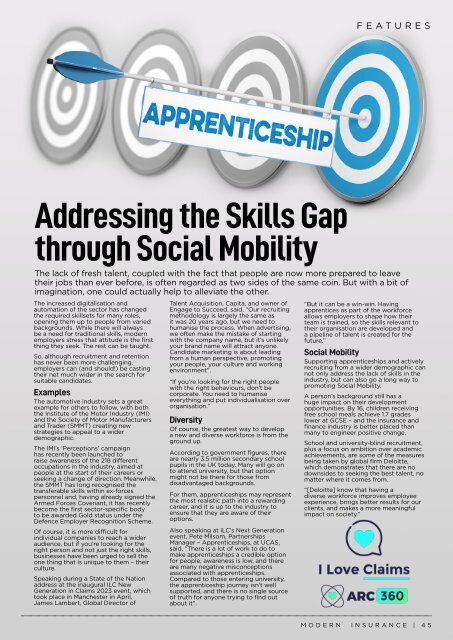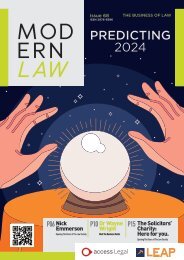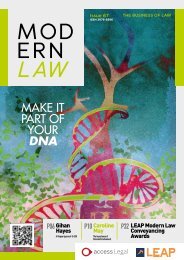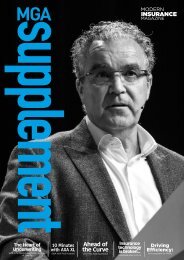Modern Insurance Magazine Issue 61
Create successful ePaper yourself
Turn your PDF publications into a flip-book with our unique Google optimized e-Paper software.
FEATURES<br />
Addressing the Skills Gap<br />
through Social Mobility<br />
The lack of fresh talent, coupled with the fact that people are now more prepared to leave<br />
their jobs than ever before, is often regarded as two sides of the same coin. But with a bit of<br />
imagination, one could actually help to alleviate the other.<br />
The increased digitalisation and<br />
automation of the sector has changed<br />
the required skillsets for many roles,<br />
opening them up to people from varied<br />
backgrounds. While there will always<br />
be a need for traditional skills, modern<br />
employers stress that attitude is the first<br />
thing they seek. The rest can be taught.<br />
So, although recruitment and retention<br />
has never been more challenging,<br />
employers can (and should!) be casting<br />
their net much wider in the search for<br />
suitable candidates.<br />
Examples<br />
The automotive industry sets a great<br />
example for others to follow, with both<br />
the Institute of the Motor Industry (IMI)<br />
and the Society of Motor Manufacturers<br />
and Trader (SMMT) creating new<br />
strategies to appeal to a wider<br />
demographic.<br />
The IMI’s ‘Perceptions’ campaign<br />
has recently been launched to<br />
raise awareness of the 218 different<br />
occupations in the industry, aimed at<br />
people at the start of their careers or<br />
seeking a change of direction. Meanwhile,<br />
the SMMT has long recognised the<br />
transferable skills within ex-forces<br />
personnel and, having already signed the<br />
Armed Forces Covenant, it has recently<br />
become the first sector-specific body<br />
to be awarded Gold status under the<br />
Defence Employer Recognition Scheme.<br />
Of course, it is more difficult for<br />
individual companies to reach a wider<br />
audience, but if you’re looking for the<br />
right person and not just the right skills,<br />
businesses have been urged to sell the<br />
one thing that is unique to them – their<br />
culture.<br />
Speaking during a State of the Nation<br />
address at the inaugural ILC New<br />
Generation in Claims 2023 event, which<br />
took place in Manchester in April,<br />
James Lambert, Global Director of<br />
Talent Acquisition, Capita, and owner of<br />
Engage to Succeed, said, “Our recruiting<br />
methodology is largely the same as<br />
it was 20 years ago, but we need to<br />
humanise the process. When advertising,<br />
we often make the mistake of starting<br />
with the company name, but it’s unlikely<br />
your brand name will attract anyone.<br />
Candidate marketing is about leading<br />
from a human perspective, promoting<br />
your people, your culture and working<br />
environment”.<br />
“If you’re looking for the right people<br />
with the right behaviours, don’t be<br />
corporate. You need to humanise<br />
everything and put individualisation over<br />
organisation.”<br />
Diversity<br />
Of course, the greatest way to develop<br />
a new and diverse workforce is from the<br />
ground up.<br />
According to government figures, there<br />
are nearly 3.5 million secondary school<br />
pupils in the UK today. Many will go on<br />
to attend university, but that option<br />
might not be there for those from<br />
disadvantaged backgrounds.<br />
For them, apprenticeships may represent<br />
the most realistic path into a rewarding<br />
career, and it is up to the industry to<br />
ensure that they are aware of their<br />
options.<br />
Also speaking at ILC’s Next Generation<br />
event, Pete Milsom, Partnerships<br />
Manager – Apprenticeships, at UCAS,<br />
said, “There is a lot of work to do to<br />
make apprenticeships a credible option<br />
for people; awareness is low, and there<br />
are many negative misconceptions<br />
associated with apprenticeships.<br />
Compared to those entering university,<br />
the apprenticeship journey isn’t well<br />
supported, and there is no single source<br />
of truth for anyone trying to find out<br />
about it”.<br />
“But it can be a win-win. Having<br />
apprentices as part of the workforce<br />
allows employers to shape how their<br />
team is trained, so the skills relevant to<br />
their organisation are developed and<br />
a pipeline of talent is created for the<br />
future.”<br />
Social Mobility<br />
Supporting apprenticeships and actively<br />
recruiting from a wider demographic can<br />
not only address the lack of skills in the<br />
industry, but can also go a long way to<br />
promoting Social Mobility.<br />
A person’s background still has a<br />
huge impact on their development<br />
opportunities. By 16, children receiving<br />
free school meals achieve 1.7 grades<br />
lower at GCSE – and the insurance and<br />
finance industry is better placed than<br />
many to engineer positive change.<br />
School and university-blind recruitment,<br />
plus a focus on ambition over academic<br />
achievements, are some of the measures<br />
being taken by global firm Deloitte,<br />
which demonstrates that there are no<br />
downsides to seeking the best talent, no<br />
matter where it comes from.<br />
“[Deloitte] know that having a<br />
diverse workforce improves employee<br />
experience, brings better results for our<br />
clients, and makes a more meaningful<br />
impact on society.”<br />
MODERN INSURANCE | 45
















